By Therese Azevedo, Daniela Ali Beckelhymer, Jazmin Thera Jones, Lucy Adriana Martinez, Danae Sarahi Galan Covarrubias, and Arshia Singhal
The Institute for Pure and Applied Mathematics (IPAM)—which is located on the campus of the University of California, Los Angeles—hosted the inaugural Applied Mathematics Skills Improvement for Graduate Studies Advancement (AMIGAs) program in July 2023. Erika Tatiana Camacho (University of Texas at San Antonio), Keisha Cook (Clemson University), Malena Español (Arizona State University), Alicia Prieto-Langarica (Youngstown State University), and Nancy Rodriguez (University of Colorado Boulder) led this pioneering initiative, which is redefining the landscape of applied and computational mathematics education. Inspired by the successful Roots of Unity Workshop at the University of Minnesota’s Institute for Mathematics and its Applications, the weeklong AMIGAs program targets incoming second- and third-year graduate students who specialize in applied and computational mathematics. Its core mission is to nurture a new generation of mathematical scientists and champion diversity through the active involvement of women and underrepresented minorities in both academic and industrial sectors.
Elevating Technical Proficiency
To help participants develop their technical foundations prior to the workshop, organizers granted them access to three DataCamp courses: Introduction to R, Introduction to Python, and Machine Learning with scikit-learn. Enrollees received a six-month subscription to DataCamp and earned official certificates upon course completion. During the week of the AMIGAs program, 21 graduate students from across the U.S. engaged in a variety of tutorials to sharpen their skills in data science and applied mathematics. Vianey Leos Barajas and Sofia Ruiz Suarez (both of the University of Toronto) led a session on statistical foundations that offered insights into probability distributions, sample sizes, and data simulation with R. Cook helped attendees construct data-driven mathematical models, with an emphasis on simulations and inference methods for outcome prediction. F. Patricia Medina (City University of New York) and Marilyn Vazquez (Simpson College) conducted a tutorial on light detection and ranging (LiDAR) technology that encompassed data cleaning, feature engineering, classification via Python, dimensionality reduction, and neural networks. Umaa Rebbapragada (NASA Jet Propulsion Laboratory) showcased data science’s ability to streamline image analysis in extensive archives and employed supervised learning techniques for efficient image feature classification. These tutorials collectively equipped students with indispensable practical skills for data-centric fields.
The meticulous design of the AMIGAs program is evident in its thoughtfully structured schedule, which featured both morning and afternoon training sessions. Each day commenced with breakfast and networking opportunities that set the stage for hands-on technical training in either Python or R. Instructors provided well-documented scripts and pertinent datasets and fostered a collaborative learning environment that encouraged active participation. Afternoons were dedicated to practical exercises that directly aligned with the day's technical focus, promoting problem-solving and the application of acquired skills.
Professional development activities led by Selenne Bañuelos (IPAM and California State University Channel Islands), Español, Prieto-Langarica, and Rodriguez complemented the technical sessions and offered valuable insights into career navigation within the mathematical sciences. These sessions addressed topics such as mentorship dynamics, communication strategies in academia, and various opportunities for graduate students. They also created a supportive atmosphere for networking and prompted meaningful conversations that gave attendees a holistic perspective on their career paths.
Participants of the first Applied Mathematics Skills Improvement for Graduate Studies Advancement (AMIGAs) program, which took place in July 2023 at the Institute for Pure and Applied Mathematics (IPAM) in Los Angeles, Calif., gather for a group photo. Photo courtesy of IPAM.
Why You Should Apply
The AMIGAs program is a remarkable opportunity for graduate students in the early stages of their academic journeys. It combines cutting-edge topics in data science and applied mathematics, providing critical exposure to real-world problems that will shape future careers. With expert tutorial speakers, hands-on exercises, and access to well-documented data resources, students acquire essential technical skills while building valuable connections with peers and mentors. Beyond academic growth, AMIGAs also establishes a supportive network of women in academia and industry who share a passion for applied mathematics. This weeklong workshop prioritizes community building, networking, and personalized professional development to empower participants towards excellence in the mathematical sciences. AMIGAs is more than just a program; it is a transformative experience that equips young mathematicians with the tools, knowledge, and connections they need to excel in their careers and make lasting impacts in their fields.
The AMIGAS program will soon be incorporated into the Mathematical Sciences Institutes Diversity Initiative; moving forward, the program will take place every two years. The next iteration of AMIGAs will be held at the American Institute of Mathematics—which is located on the campus of the California Institute of Technology—from June 23-28, 2025.
Generous Support from the SIAM Community
When recruiting participants for AMIGAs, Español posted the program announcement on SIAM Engage — SIAM’s vibrant online member community. Almost immediately, SIAM member Ersen Arseven sent a heartwarming email in support of the program. His generosity knows no bounds, as his substantial donation financed all of the meals during the program and provided essential support for various activities. This kind of response exemplifies the spirit of collaboration and dedication that SIAM members bring to the table, making initiatives like AMIGAs even more impactful and accessible to aspiring mathematical scientists. We extend our deepest gratitude to Arseven and the entire SIAM community for their unwavering commitment to advancing the fields of applied mathematics and computational science.
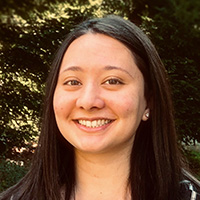
|
Therese Azevedo is a graduate student in statistics at Montana State University. Her interests include statistical modeling, environmental science, and science communication.
|

|
Daniela Ali Beckelhymer is a graduate student at the University of Minnesota and a Latina mathematician who specializes in Arctic sea ice models. She is dedicated to championing diversity, equity, and inclusion and is actively involved in initiatives that support underrepresented minorities at her university.
|
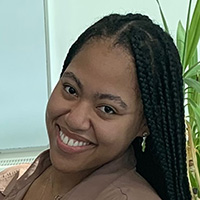
|
Jazmin Thera Jones is a third-year graduate student in applied mathematics at Howard University. She aims to bring more opportunities to fellow members of minority groups to diversify and encourage innovation within the mathematics community.
|
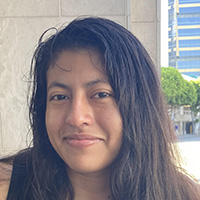
|
Lucy Adriana Martinez is a third-year graduate student in mathematics at Rutgers University. She seeks to support the Hispanic mathematical community and encourage other Hispanic students to pursue their dreams. More information is available on her website.
|
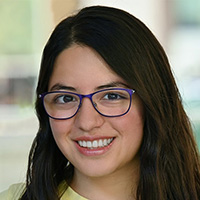
|
Danae Sarahi Galan Covarrubias is an international student from Mexico who is pursuing a Ph.D. in mathematics at the University of Minnesota. Her mathematical interests lie in statistics, machine learning, and data science.
|
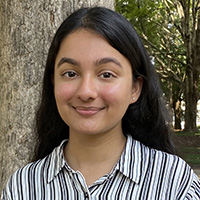
|
Arshia Singhal is a second-year graduate student in the Department of Computational Applied Mathematics and Operations Research at Rice University. Her research interests include numerical analysis and scientific computing, and she hopes to increase diversity in STEM fields — especially for women in mathematics.
|